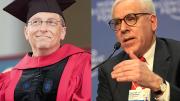During the September 21, donor-focused launch events for The Harvard Campaign, Bill Gates ’77, LL.D. ’07 (co-founder of Microsoft, and co-chair and trustee of the Bill & Melinda Gates Foundation), and David M. Rubenstein (the father of daughters in the College classes of 2007 and 2010, and co-founder and co-chief executive officer of The Carlyle Group, the Washington, D.C.-based private-equity and investment-management firm), met for a public discussion on philanthropy, titled “The Opportunity to Make a Difference.” (For background on Gates’s undergraduate experience at Harvard, read Walter Isaacson’s account, just published online. Read biographical background on Rubenstein, a co-chair of the campaign, here.)
Interestingly, the two men represent different approaches to contemporary philanthropy.
Gates has made one highly visible, traditional gift to Harvard: he and classmate Steven A. Ballmer ’77, Microsoft’s CEO, funded construction of Maxwell Dworkin, the home to the computer-sciences and electrical-engineering faculties, within the School of Engineering and Applied Sciences. But overwhelmingly, Gates and his wife, Melinda Gates, have eschewed conventional support for established beneficiaries: schools (professorships, fellowships, buildings), cultural institutions, social-services providers. They have instead chosen to apply their enormous wealth, through their eponymous foundation, to pursue research-driven, strategic, and measurable solutions to global problems: eradicating diseases; enhancing the effectiveness of K-12 education; improving disadvantaged students’ access to and chances of success in obtaining higher education; and promoting economic development in underdeveloped nations (through investments in healthcare, education, nutrition, sanitation, and agricultural productivity).
If anything, Gates has by now become better known for his influence as a philanthropist, and his advocacy of such giving among people of means, than for his remarkable business career.
Earlier this month, the Lasker Foundation, which makes annual awards for advances in medical research, conferred its public-service award on the Gateses “for leading a historic transformation in the way we view the globe’s most pressing health concerns and improving the lives of millions of the world's most vulnerable.” The awards were presented on September 20 in New York City.
A significant supporter of the Harvard Kennedy School, Rubenstein has served at the highest level on the boards of directors or trustees of many institutions: the Kennedy Center for the Performing Arts, the Smithsonian Institution, Duke (his alma mater), the University of Chicago (his law school), Lincoln Center, the Brookings Institution, the Council on Foreign Relations, the Institute for Advanced Study (at Princeton), and elsewhere. His giving has often been associated with those organizations—Duke has been a frequent beneficiary (for the rare-book library, athletics, the public-policy school); Chicago received a $10-million scholarship fund; the Kennedy Center received $50 million to fund an expansion—and to such causes as the repair of the Washington Monument ($7.5 million); the National Zoo ($4.5 million for the panda program, $2 million for elephant facilities); new visitor facilities and galleries for the National Archives, where his copy of the Magna Carta is on display ($13.5 million, opening November 8); and upkeep for Mount Vernon and Monticello ($10 million each).
The Harvard Campaign, of course, aspires to cultivate significant support from both loyal alumni and traditional charitable givers, and the new-style, strategic philanthropists like those Gates has inspired.









